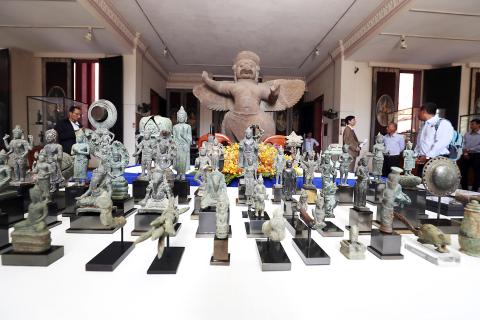Millennium-old Cambodian artifacts displayed in a Japanese collector’s home for two decades have been returned to the Southeast Asian country’s National Museum.
The 85 artifacts are mostly small bronze items and include statues of Buddha and the Hindu god Shiva, plus jars, ceramics and jewelry.
The Cambodian Ministry of Culture and Fine Arts has said that some items were older than the Angkor era, which began in about the eighth century, while others date from the Angkor era or just after it ended in the late 14th century.

Photo: AP
Cambodia has made intense efforts to recover artifacts looted during its civil war in the 1970s.
At an official reception for the artifacts yesterday, Cambodian Secretary of State for Culture and Fine Arts Prak Sonnara praised the Japanese collector for voluntarily returning the artifacts, saying that her actions set a good sample for other countries and collectors to follow.
Fumiko Takakuwa, told reporters after the handover ceremony that she and her husband had bought the items in Japan and liked to collect and display them in their home, but she knew they were originally from Cambodia and that is why she returned them.
“My husband had said before he passed away that those artifacts have to be returned back to Cambodia, and today I am happy that I did,” Takakuwa said.
The 85 items were believed to have been stolen from Cambodia’s temples during the war, when intense looting occurred and valuables were smuggled through neighboring Thailand, Prak Sonnara said.
A 1993 Cambodian law prohibited the removal of cultural artifacts without government permission. The law strongly compels owners of items taken abroad after that date to return them.
However, there is also general agreement in the art world that pieces were acquired illegitimately if they were exported without clear and valid documentation after 1970 — the year of a UN cultural agreement targeting trafficking in antiquities.

POLITICAL PRISONERS VS DEPORTEES: Venezuela’s prosecutor’s office slammed the call by El Salvador’s leader, accusing him of crimes against humanity Salvadoran President Nayib Bukele on Sunday proposed carrying out a prisoner swap with Venezuela, suggesting he would exchange Venezuelan deportees from the US his government has kept imprisoned for what he called “political prisoners” in Venezuela. In a post on X, directed at Venezuelan President Nicolas Maduro, Bukele listed off a number of family members of high-level opposition figures in Venezuela, journalists and activists detained during the South American government’s electoral crackdown last year. “The only reason they are imprisoned is for having opposed you and your electoral fraud,” he wrote to Maduro. “However, I want to propose a humanitarian agreement that

ECONOMIC WORRIES: The ruling PAP faces voters amid concerns that the city-state faces the possibility of a recession and job losses amid Washington’s tariffs Singapore yesterday finalized contestants for its general election on Saturday next week, with the ruling People’s Action Party (PAP) fielding 32 new candidates in the biggest refresh of the party that has ruled the city-state since independence in 1965. The move follows a pledge by Singaporean Prime Minister Lawrence Wong (黃循財), who took office last year and assumed the PAP leadership, to “bring in new blood, new ideas and new energy” to steer the country of 6 million people. His latest shake-up beats that of predecessors Lee Hsien Loong (李顯龍) and Goh Chok Tong (吳作棟), who replaced 24 and 11 politicians respectively

Young women standing idly around a park in Tokyo’s west suggest that a giant statue of Godzilla is not the only attraction for a record number of foreign tourists. Their faces lit by the cold glow of their phones, the women lining Okubo Park are evidence that sex tourism has developed as a dark flipside to the bustling Kabukicho nightlife district. Increasing numbers of foreign men are flocking to the area after seeing videos on social media. One of the women said that the area near Kabukicho, where Godzilla rumbles and belches smoke atop a cinema, has become a “real

‘WATER WARFARE’: A Pakistani official called India’s suspension of a 65-year-old treaty on the sharing of waters from the Indus River ‘a cowardly, illegal move’ Pakistan yesterday canceled visas for Indian nationals, closed its airspace for all Indian-owned or operated airlines, and suspended all trade with India, including to and from any third country. The retaliatory measures follow India’s decision to suspend visas for Pakistani nationals in the aftermath of a deadly attack by shooters in Kashmir that killed 26 people, mostly tourists. The rare attack on civilians shocked and outraged India and prompted calls for action against their country’s archenemy, Pakistan. New Delhi did not publicly produce evidence connecting the attack to its neighbor, but said it had “cross-border” links to Pakistan. Pakistan denied any connection to